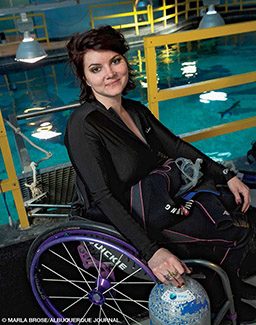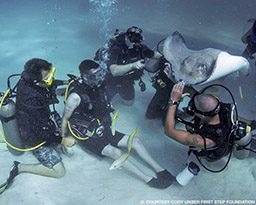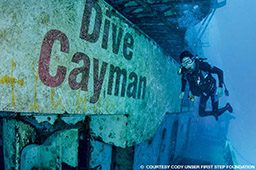On Feb. 5, 1999, at the age of 12, I found myself learning how to do everything with a paralyzed body. I was diagnosed with transverse myelitis, an autoimmune condition in which my immune system attacked my spinal cord. Growing up in an auto-racing family came with the expectation that by age five all of us kids would know how to ride four-wheelers, go-karts, jet skis and snowmobiles — basically anything with a motor, a throttle and brakes. Figuring out how I was going to live life in a wheelchair with a paralyzed body was an enormous and emotional challenge.
After spending months in rehabilitation where therapists taught me how to dress myself, catheterize myself and transfer into and out of my wheelchair, I went home struggling with my new identity but waking up each day wanting to use my voice to make a difference. With the help of my mother, Shelley, I created the Cody Unser First Step Foundation (CUFSF) to raise awareness about transverse myelitis and to advocate and improve the quality of life for people with disabilities.
After I became paralyzed, all my thoughts and actions involved my broken body. The next year my older brother, Al, encouraged me to get scuba certified. Scuba diving erased my doubts about whether I was going to succeed at anything in life. On my certification trip I realized, if I can do this, I can do anything. The world above went silent, and I found myself underwater with my family — doing the exact same thing they were doing. Suddenly life had a lot to offer. I wanted to share these new feelings of confidence and independence with other people with disabilities who might feel like giving up.
Promoting Access

Adaptive sports can help people with disabilities improve their physical, mental and emotional health. Through CUFSF we developed a quality-of-life program called Cody’s Great Scuba Adventures, which brings together medical and dive professionals at the same table, or rather, in the same pool.
Raising awareness and promoting inclusion are at the core of CUFSF’s adaptive scuba diving program. In an ideal world, anyone with a disability would be able to go to any dive shop or dive site and be welcomed by at least one instructor familiar with his or her disability and capable of effectively adapting the sport for him or her.
Teaching someone with a disability how to scuba dive is no small endeavor. In 17 years of advocating for adaptive diving and witnessing the dedication of my dive instructors, I have learned a lot about facilitating the diving experience for people with disabilities. One such lesson is that many people with spinal cord injuries manage autonomic dysreflexia, an involuntary response to an injury or stimulus to a part of the body that lacks sensation. When I surface from a dive, a full bladder or a brush with fire coral on my lower body might trigger a headache or even make my blood pressure rise, which must be dealt with immediately.
It is so meaningful to work with an instructor who knows the basics of managing such secondary conditions (post-injury issues). Other secondary conditions include bladder and kidney infections, pressure sores, osteoporosis, scoliosis, bowel maintenance, heart problems due to poor blood circulation, depression and anxiety, fatigue, pain and loss of muscle mass. These conditions can often seem to be the dominant forces in the life of a person with a disability. Even simple awareness of these issues by dive staff can really make a difference.

Jacques Cousteau once said, “From birth, man carries the weight of gravity on his shoulders. He is bolted to Earth. But man has only to sink beneath the surface and he is free.” For the paralyzed person, this feeling of freedom is greatly enhanced, because diving releases not only the bolts to earth but also the bolts that lock the body to the wheelchair.
In 2011 CUFSF teamed with Paralyzed Veterans of America, researchers from Johns Hopkins University and our dive instructors to certify nine paralyzed veterans and to study the neurological and psychological effects of scuba diving on paralyzed people. It took 10 years to convince my neurologist and neuropsychiatrist that the sensations I was feeling at depth warranted medical investigation. The study seemed to document the improvements I felt underwater in other divers, too. Most participants with PTSD symptoms reported some relief, and the researchers believe it is worth continuing the study.
Looking Ahead
CUFSF’s adaptive scuba program will continue to bring together the dive industry and medical professionals for a future in which dive professionals around the world will understand all kinds of disabilities.

Each person with a disability has specific needs, and adaptive diving requires instructors who will be patient and able to think outside the box to make the experience possible. Divers with spinal cord injuries, for example, may need a certain weighting strategy to improve their trim, while divers with visual impairments may require sensory training.
Through scuba diving, not only can I achieve freedom from gravity, I can also share an experience with my family that requires relatively little adaptation. Historically, people with disabilities have faced limitations to physical activity not only because of physical barriers but also because of inadequate resources and knowledge among professional facilitators. This is why it is so crucial for the dive industry to see the impact it can have in evolving the sport to not simply include people with disabilities on dive boats and underwater with everyone else, but to do so with a deep understanding of what a person with a disability experiences on a daily basis.
According to the Centers for Disease Control and Prevention, 53 million Americans have some form of disability. Scuba diving provides an opportunity to enhance self-worth, independence and confidence; it can be a catalyst that makes formerly impossible things in life possible. CUFSF will continue conducting dive research studies, training dive and medical professionals and bridging the gap between the dive industry and the disability community. I have enjoyed seeing the dive industry embrace this community; it’s not always easy, and sometimes it gets political, but those of us living with a disability are not going away anytime soon.
Explore More
Watch the trailer for a documentary about Cody Unser, then see a video about how the Cody Unser First Step Foundation has helped young patients at Riley Hospital for Children learn to scuba dive.
© Alert Diver — Q3 Summer 2016